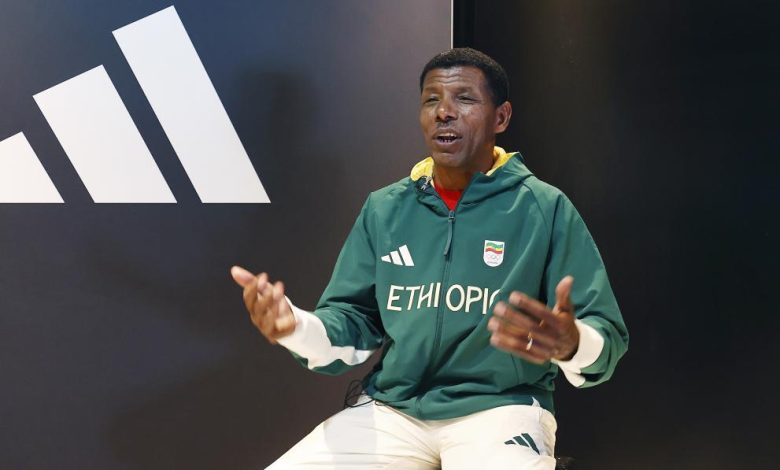Haile Gebrselassie: “Before 2030 the marathon will be below two hours”

Haile Gebrselassie, now 51 years old, maintains his graceful figure and the smile from 25 years ago. He is now a businessman, hotels, other things, and he still runs every morning. “But not much. Eight or 10 kilometers. On the weekends I do long runs. I miss the competition. People ask me why I don’t run popular marathons in two hours and a bit or three hours, but I have a defect: I only “I know how to run in the front positions.”
When the wise men are asked who has been the best athlete of all time, or at least the best distance runner, the names of Gebrselassie and Bekele come up. They no longer have any world records, but it is praised that they were able to run quickly at distances as diverse as the 1,500 (3:31.76) and the marathon (2:03.59). He adds as great rivals “Paul Tergat and Daniel Komen. If he had to choose one, he would say them.”
He was president of the country’s Athletics Federation and now follows the sport since his status as an Adidas ambassador. He witnesses the boom times of the neighboring country, Kenya, in the background. Since Patrick Makau broke his record in the 42.195 km in September 2011, the scepter has been passed from hand to hand among Kenyans up to four times without any Ethiopian athlete interceding. “The problem I see is that most Ethiopian athletes train around Addis Ababa and the Kenyans train in Eldoret, in Item… then their style is completely different. I tell them: ‘Go outside and take other teammates with you…” It is true that the altitude there is good, but we now have a lot of pollution. The city has very high levels and the athletes would need to get out of there.”
The journalist stands in front of the legend as if time had stopped. But reality breaks the deception. “You can’t compare my times with the ones we live in now,” says the eight-time world champion and two-time Olympic gold medalist in the 10,000m (1996 and 2000). “Now the kids have school three or two kilometers away, some even next door. And in my case, and I’m thankful because there was no other option, if you wanted to go to school, you had to make an effort. Think that The 10 kilometers distance meant 20 each day. And that is the most important part of my life. I mean that without that, my sports career would perhaps have been impossible for me to see these days. Look, my children, for example, will never be. athletes. Running is a gift that you have to have and that is conditioned by your circumstances. Then it is something that you have to cultivate when you are young. If you don’t follow that rhythm of life, you won’t get there.
Now the kids have school three or two kilometers away, some even next door. And in my case, and I’m thankful there was no other option, if you wanted to go to school, you had to work at it. Think that the 10 kilometers of distance meant 20 each day
The two hour barrier
When Gebre last broke the marathon record, in the race in Berlin in 2008, the two-hour barrier was still very far away. Only those who played futurists dared to bet on a frontier that now seems very within reach, especially after Eliud Kipchoge in Vienna, three years ago, ran the distance with an advantage of 1:59.40. “Going below two hours will happen very soon. In four or five years, maybe in three. Before 2030 it will happen. It’s a shame what happened to Kiptum. For me he was the one chosen to break that barrier. I don’t know who will do it now, but it will happen by some athlete from both countries. I mean from Ethiopia or Kenya.
Technology has had a lot to do with this exercise of taking a bite out of the times of the past. The arrival of the carbon plate marked a revolution in the post-Gebre era. “The work that Adidas and other companies have done is amazing. They are doing it very well and the performance of the athletes is wonderful. They are learning very quickly. And not only in the advantage they give. Recovery before took some time. Now They can make everything normal again in three or four days. The first time I tried this type of shoes, there were a lot of blisters, your feet burned. Now you save a lot of energy with the new shoes. They are working very well.
When he has tried them, the global icon says he feels “Fascinated. I have trained with them a few times and great progress has been made.”
To finish the match at the German firm’s Arena, Gebrselassie speaks about two names, Eliud Kipchoge and his compatriot Gudaf Tsegay, the 5,000 world record holder. “Kipchoge may have lost in Tokyo, but that doesn’t mean he can’t win in Paris. The Games are something different. He is a very experienced athlete and to run in the Games they have the advantage that he knows the way to win that career”.
“Tsegay is fascinating. Now he has jumped to 10,000 too and in the future it is possible that I will do it in the marathon,” he corroborates.





